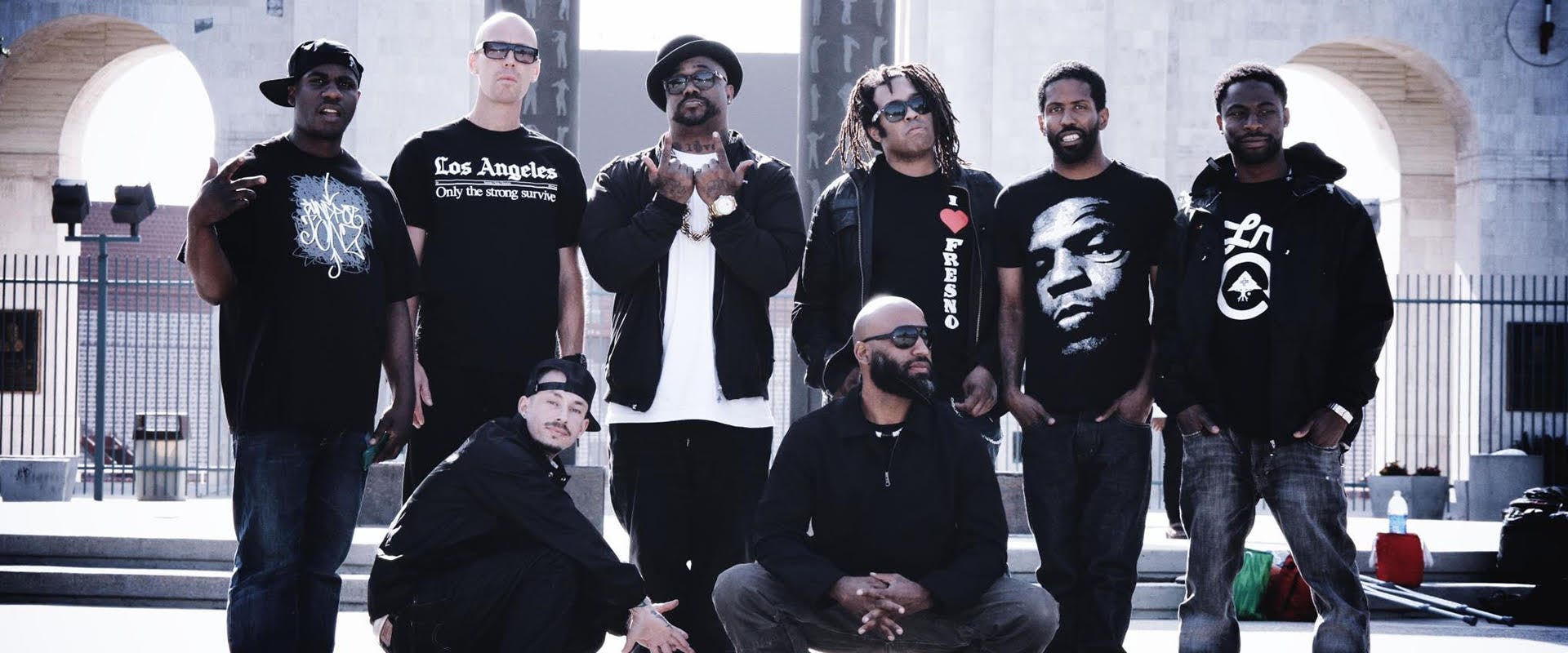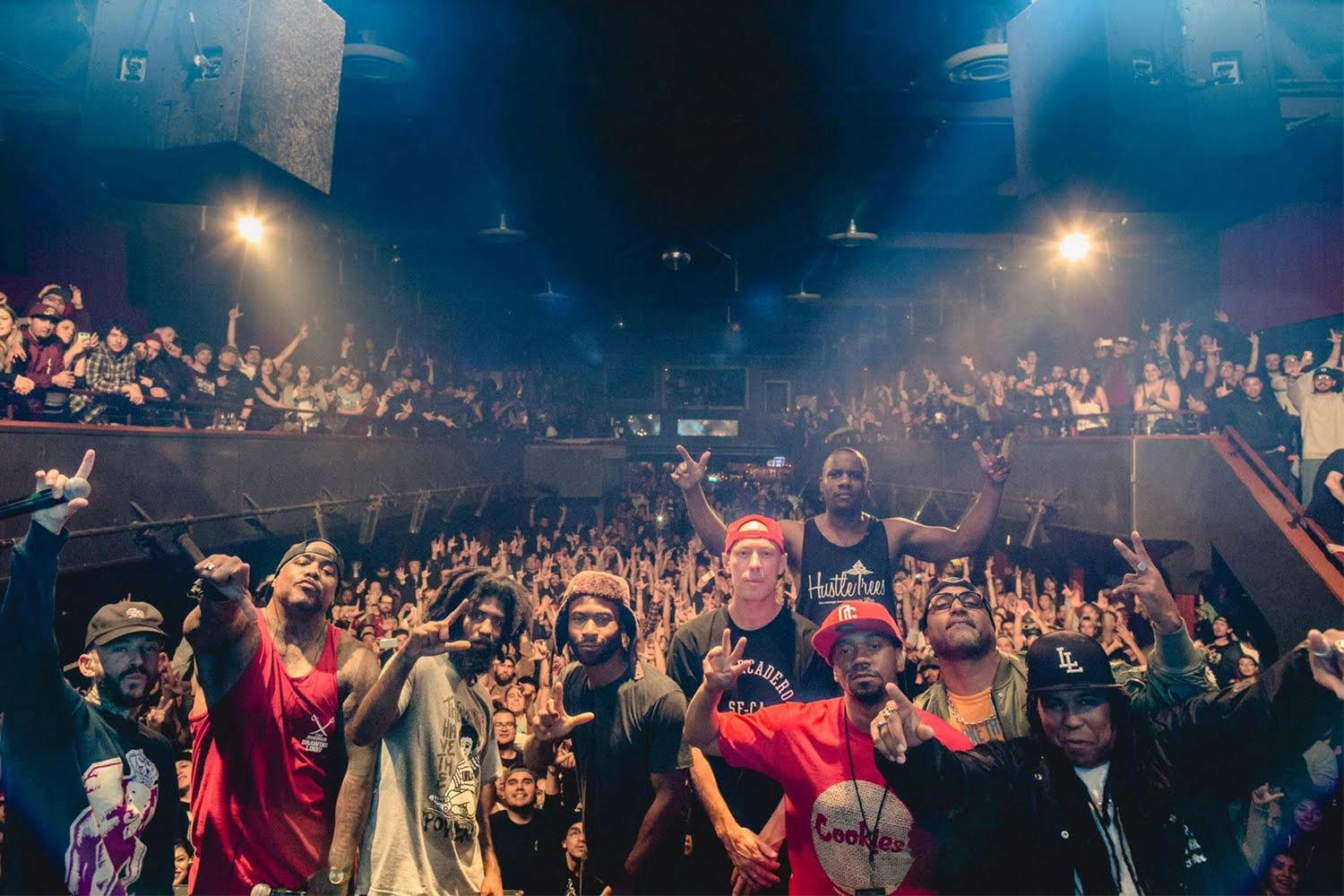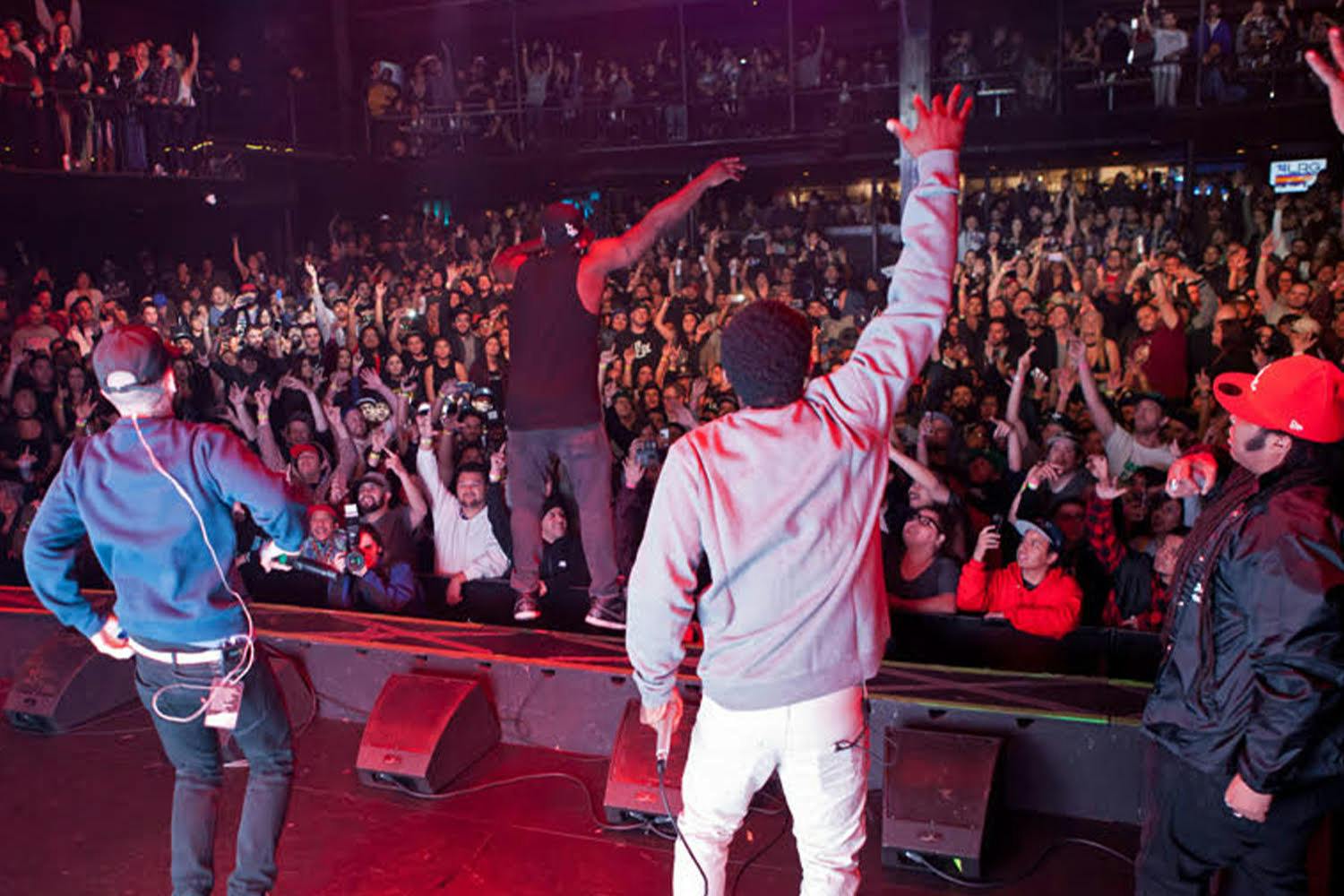

Living Legends Return — But Were They Ever Really Gone?
Living Legends Return — But Were They Ever Really Gone?
By Kyle Eustice
Published Wed, December 1, 2021 at 12:00 PM EST
Living Legends took a few notes from Bay Area rap staples Too $hort and E-40 in the early days, slanging CDs and cassette tapes from the trunks of their cars in hopes of taking their careers to the next level.
Fellow West Coast Hip-Hop groups such as the Pharcyde, Hieroglyphics, and Freestyle Fellowship had already laid the blueprint for intelligent rhyming and undeniably defined the ‘90s era sound. Taking their lead, Living Legends carved out their own niche lane with their signature brand of boom bap beats, wordplay wizardry and real life raps. Their independent hustle worked — and Murs, Eligh, The Grouch, Luckyiam, Sunspot Jonz, Aesop, Bicassom and Scarub wound up selling over 300,000 album units on their own.
“Souls of Mischief, the Pharcyde, and Freestyle Fellowship raised the bar,” Aesop tells Rock The Bells. “I knew I wasn't going to make it in the rap game if I couldn't compete with that level of wordplay. I was from Fresno, California, which was hood as fuck and very gang-related, so I tried my damndest to keep my raps focused on higher learning.
“Planet Asia, who’s also from Fresno, was a huge part of that for me, as well. We would call each other on the phone and recite our raps over the homie Protest's beats. This is when I sharpened my blade and started to really go hard with my rhyme play. Of course, I still was listening to E-40 and Tupac Shakur, which gave me my game, but I kept strong with the style I wanted to run with and didn’t head down the gangster path.”

Two-hundred miles away in Los Angeles, Eligh had started rapping in junior high—“at least out loud to other humans,” he says with a laugh—and joined Living Legends at 18, a few years after he, Murs and Scarub had found some notoriety with 3 Melancholy Gypsys. Armed with similar influences to both The Grouch and Aesop, he was also immersed in the pioneering gangsta rap permeating the City of Angels at the time.
“Some of my first favorites ever were Eazy-E, N.W.A and Ice Cube,” Eligh says. “Ice Cube still holds a Top 5 album ever for me with Death Certificate. Knowing that my favorite artists lived in my own city and state gave me pride to be a West Coast kid.”
But Living Legends likely wouldn’t exist without Mystik Journeymen, a duo comprised of Sunspot Jonz and Luckyiam. Both The Grouch and Aesop credit them for paving the way.
“I moved to the Bay Area to record with my friend JD and Khoa to make my first album Demonstration,” Aesop explains. “I went to an event that was thrown by Mystik Journeymen called ‘Underground Survivors,’ recited one of my raps on stage A cappella and got a great response.
“I met Grouch that night and he invited me over to his basement studio to record ‘From Where I Stand,’ which for me would be the start. I had met the Mystik Journeymen previously ‘cause they lived in the same complex as my cousin. Bicasso and I had met at another friend's house in Telegraph. We all seemed to gravitate to one another in that year.”
The Grouch adds, “I initially wanted to be a producer and not rap, but I had a friend who wanted a rapping partner and he encouraged me. I had and still have rhythm problems [laughs]. It took a lot of repetition for me to become decent. I would say Living Legends formed itself a couple of years after I started. Mystik Journeymen was the established nucleus and then came me and Murs, and we kept adding until it naturally felt complete.”
A big part of Living Legends’ underground triumph is due to their genuine love for their fans and as Aesop explains, it was a conscious choice to always include them in their journey.
“Shaking hands and signing autographs was cool and all, but we were known for actually hanging out with them at after parties and making friends along the way as we toured the world,” he says. “I consider every one of our fans family, and we owe them a huge amount of our success. Having such loyal fans stick with us for a couple of decades has solidified our resolve to keep making music for them.”
Eligh agrees: “I think having such a loyal group of supporters is the number one asset of being independent in a time before the internet was what it is today. I wouldn’t still be thriving in this era without those wonderful souls.”
And as The Grouch points out, Living Legends is very much an underdog story. And people always root for the underdog.
“We have consistently been one of the most truly independent groups in Hip Hop,” The Grouch says. “No manager, Kinkos copied tape covers, hand-to-hand sales, self-funded world tours, et cetera. We were and still are the scrappy underdogs. People felt it, smelled it, identified with it and supported us for it. We wouldn't be Legends without them.”

But after 16 projects, including 2000’s Angelz Wit Dirty Faces, 2004’s Creative Differences and 2005’s Classic, the group went on hiatus while various members started down the solo path. Some members even clicked up for offshoots—The Grouch and Eligh released multiple projects as G&E while Eligh explored Hindustani classical music with Grand Tapestry alongside classically trained musicians Alam Khan and Salar Nade. Meanwhile, Murs—more or less always the lone wolf of the group—was committed to ruling the world and yearned to do his own thing.
“After we released ‘Trojan Horse in 2008 [from The Gathering], I believe Murs was ready to take his career to the next level and there were many internal issues with the group at the tine that was holding him back,” Aesop recalls. “Grouch, I believe, felt the same, though it would be better for them to explain as I was surprised by the sudden breakup as much as our fans were.”
“Murs just always did Murs,” Eligh offers. “And Grouch on hiatus? We’ve been making Grouch and Eligh music nonstop for 25 years, so I don’t recall that either. What I can tell you is in 2012, I had dropped two very significant solo albums in a row: Grey Crow and Therapy At 3 with [Zion I producer] Amp Live. So I was doing solo tours and quit smoking cigarettes in 2012, which was a huge point in my life for many reasons. It was a time of personal turmoil and change for me personally.”
While Grouch didn’t get into specifics, he appreciates the complexities of navigating such a large collective.
“It's difficult,” he admits. “We don't have anyone in the group that everyone wants to listen to. There's egos involved. People live in different cities, and there’s solo careers and side groups outside of Living Legends. We're all on our own timelines. There are very few photos of all members together ‘cause even that is like pulling teeth to accomplish.”
“Surprisingly, we rarely fought each other,” Aesop says with a sense of astonishment. “When there were conflicts, the Mystik Journeymen being the elders of the group, kept us in check and focused on the prize. If that didn't help, a round of Mario Kart, Street Fighter or a game of dice would help settle tension.”
No matter what the issues, the members of Living Legends always came back to a place of love for one another.
“All of us are so different personality-wise absolutely, so challenges always arose, mostly on tour,” Eligh says. “But when your friends are like brothers, it just becomes a dysfunctional family who love each other and fight.”
“It was trying at times but for me, I consider everyone a brother,” Aesop continues. “I think the distinct individual personalities are what made our sound. Ego got in the way sometimes but for the most part, we all treated each other like family and it shows in the music we have made to this day.”
“Sometimes it’s OK to disagree,” Grouch adds matter-of-factly. “Sometimes time itself can resolve things. Sometimes we grow and see things differently than we once did.”
Living Legends have essentially grown up together, enough to solidify any relationship. But when Eligh was in the throes of addiction, the rest of the Living Legends were experiencing their own growing pains, so it was even more challenging to see just how low he’d sunk.
“At the time I was personally at my worst, honestly everyone was living on the edge,” he says. “Even though some guys knew I was in a bad place, I think everyone was going a bit crazy back then, so it was even harder to see that I personally was off the deep end. It’s not like I shared what I was doing with the guys. I kept it to myself, until the day I decided enough was enough.”
Now 16 years clean, Eligh has become a shining beacon of hope for so many who look up to him for staying locked in to his recovery, which allows him to pursue his creative endeavors with a fresh pair of eyes. Still, Living Legends hasn’t released an official group album since 2005, an unusually long stretch. Even The Grouch is perplexed by the lack of collective output.
“I wonder the same thing almost every day in recent history,” he says. “Life got in the way maybe. Hurt feelings, families, solo careers? I’m still trying to figure it out.”
In 2016, The Grouch orchestrated a reunion as part of his tenth annual How The Grouch Stole Christmas Tour. Naturally, conversations started to take place about doing another project. Five year later, Living Legends are in a place where another album is beginning to take shape—but Grouch isn’t exactly ready to call it one.
“We're creating,” he says. “I’m not gonna say that it's an album because I'm not sure if that's what's being created. There are songs. I can only speak from my perspective, but my friendships with each of my brothers in the group are strong. I'm enjoying being around the guys when it happens and excited about what could be the outcome of putting in work.”
Eligh reveals “it’s happening slowly” only because they are scattered all over California—but it’s happening.
“It’s different,” he explains. “A bunch of songs we have, we were together to make, but it just takes a lot of work to finish a group project. Since I had my daughter in December 2020, I’m moving a lot slower too. I will say, the thought of this album being finished and coming out feels like a reason to celebrate and be proud.”
Aesop is mostly looking forward to hearing the fans’ feedback when they’re finally able to hear unreleased Living Legends music.
“Making music with my brothers is a joy,” he says. “We started when I was still a young adult, sneaking into clubs and venues we were headlining. When we get in the studio, make some fire then perform it on stage, there is really nothing else like it. I know how much our music has affected our fans and they have been waiting for us to return, so I'm juiced to see their reaction to our new music.”
“There is nothing better than when all of Living Legends are on the same song going hard,” Grouch says. “Nothing.”



